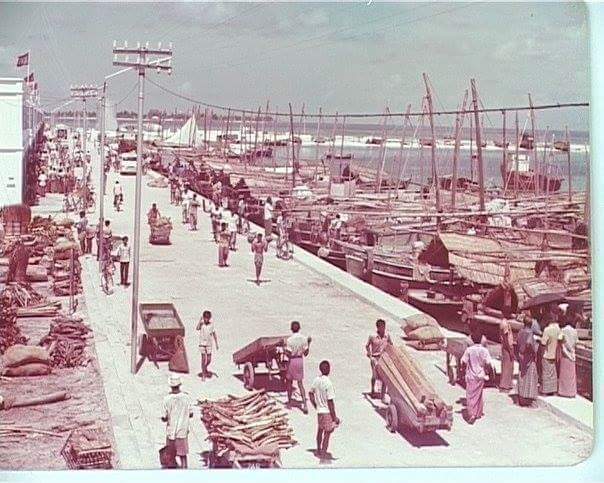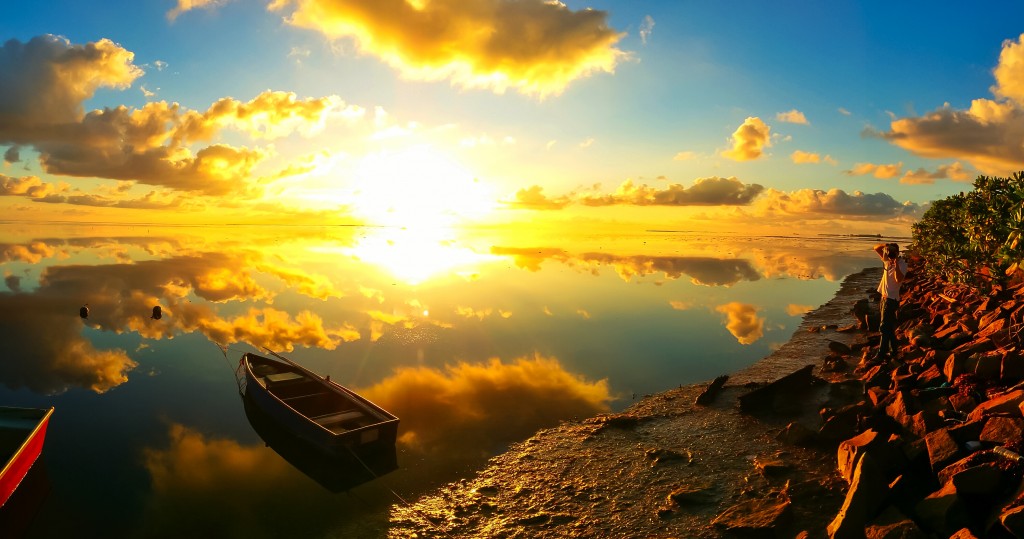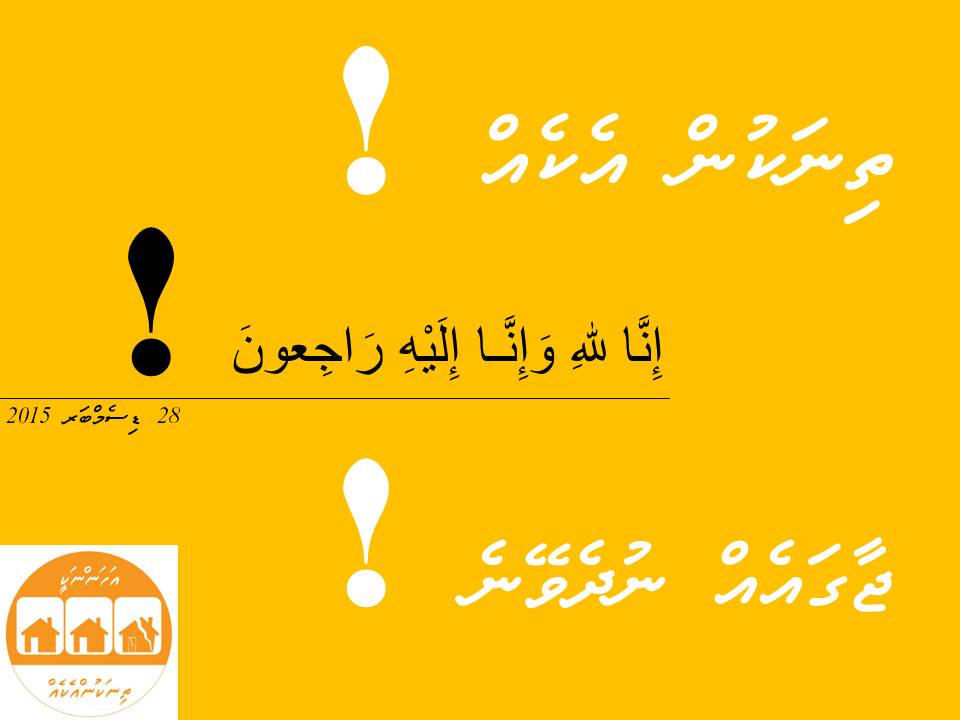Histories of Maldives

by Daniel Bosley
The Maldives is barely visible on most maps. Google it. By the time you’ve focused in on the tiny islands, the rest of the world is practically invisible. This same phenomenon can be observed when looking at Maldivian history. When you get right down to the sea-level of current affairs in the archipelago, outside events seem distant and far away.
This is no doubt very useful for the many tourists who come to relax in the country’s luxury resorts. It has also been of great use to the country’s leaders, who have traditionally been able to take advantage of the lack of outside (objective) interest in the tiny nation’s history, in order to try to maintain control over citizens in the present.
Those studying the Maldives can easily lose perspective, making it hard to understand the nation’s place in alternative histories. While political leaders repeat historical claims to complete autonomy and sovereignty, economic commentators paradoxically point out how vulnerable the nation is to external shocks. But just such a perspective is needed to better understand the reality of a small nation adrift on the currents of global history.
Anyone looking into the history of the isles will soon come across two standout stories. Firstly, the Rannamari and the conversion to Islam, and secondly, the 15-year Portuguese occupation in the 16th century.
It is very difficult to obtain much factual information about much of Maldivian history, and both of these tales are lacking in detail. Yet they have been passed on from generation to generation more readily than any others. Why?
As with most histories, these tales have served a purpose for Maldivian leaders for centuries, reminding citizens that, firstly, they live in a pious Islamic nation, and secondly, that they have a proud history of independence. These creation myths are based on varying degrees of fact, and have undoubtedly been manipulated in order to better serve aims of rulers.
Indeed, President Abdulla Yameen just last week called upon citizens to learn lessons from the country’s ‘history’ as he continually rails against foreign ‘interference’. That he does so while inaugurating foreign funded projects and presiding over an economy kept afloat by foreign tourists suggests the lessons of history are not so straightforward.
Historical role-play
The Rannamari story is particularly interesting when studying history as it marks the socially acceptable starting point for the modern country’s story, a point from which remnants of the nation’s Buddhist origins can continue to be suppressed.
The conversion story itself has become wrapped up in the hagiographic proselytising of Abu Barakat. But while his tale has served the purposes of local leaders constructing their versions of Maldivian history, it also forms part of a wider history of Arabic trade and empire in the region. Laudable pragmatism is too often replaced by reductive jingoism.
Muslim entrepreneurs had long since established thriving communities on the west coast of India, and frequent contact with Maldivians undoubtedly made the unilateral decision of Koimala to convert the nation a lucrative one. Indeed, to smudge the reality of events by reducing the conversion to an encounter with a sea-monster does a disservice both to the king and to the powerful Ummah built upon the teachings of Mohammed.
The importance of perspective and symbolism can be seen again in the Portuguese colonisation story, which continues to form a powerful part of national identity and yet has barely left a trace in the Portuguese archives.
While the fabulous exploits of Bodu Thakurufaanu and his brothers make for a great independence story, those who use it today fail to acknowledge that both the Portuguese and the European powers that followed had little real interest in the isles beyond their strategic importance.
After the Portuguese left, the Dutch and the British were happy to accept tributes from Malé via Sri Lanka, with no desire to physically occupy an archipelago which had few resources and many mosquitoes. This is also indicated in the 80-year British protectorate agreement, which proved mutually beneficial (depending on your history). A more fitting conclusion to the history of foreign influence might be the importance of a benign patron.
Rather than it’s significance to colonial historians, the impact of RAF Gan might prove of greater interest to social historians for the transformative impact it had in Addu Atoll. As the British utilised the geographic importance of the southernmost archipelago, thousands of nearby islanders took advantage of the economic effects.
With the archipelago’s population growing by 400 percent during the Brits’ 30-year stay, the unintentional effect of the occupation was to create an economic power base to rival that of Male’ for the first time. The political effects were soon seen in the breakaway Suvadive Republic.
It can be argued that the political legacy of this social history stretches as far as the formation of the Maldivian Democratic Party and the subsequent transition to multiparty democracy. Ask a Malé person and an Adduan for the history of the British in the Maldives and you will receive two very different answers.
As the British empire faded following World War II, the Maldives attracted the attention of a newly resurgent Japan, no doubt attracted by the country’s fertile fishing grounds, drawing the archipelago into the history of postwar Japan (and its cuisine). This small role for the island nation brought social changes far greater than any introduced by the British, with the mechanisation of vessels and refrigerated ships changing Dhivehi society forever.
During the 70s the Maldives also benefitted from world-changing advances in commercial aviation, making international tourism a viable option for the newly independent nation. The arrival of the jet engine – a product of a global conflict that at the time had contributed to disease and famine in the Maldives – would later bring untold riches to the nation.
History Today
Indeed, an understanding of the Maldives’ place in broader historical trends can also lend insight into current relationships.
The Arabisation of Dhivehi society – written about at length by Xavier Romero-Frias – undoubtedly brings the Maldives into the history of the Middle East’s oil-monarchies. Saudi soft power continues to exert a huge influence in the Maldives, as generations of scholars have been trained in Wahhabi doctrine on Saudi petro-dollars.
The outside world’s interest in the exploits of Maldivian jihadis indicates the modern historical currents in which the Maldives finds itself sailing. The ongoing tension between Islam and the West (see histories of the Middle East and the US post – Cold War hegemonic moment) depicts a specific role for the island nation, with ‘radicals in paradise’ finding a predictably popular niche in western media outlets.
Due to its geographical importance, the Maldives also continues to play an important part in global political affairs, with an economically emboldened Chinese nation sending its civil engineers and its middle class tourists to the pristine isles with growing regularity. A glance back at history would suggest that Chinese interest mirrors that of the British, seeing the archipelago as a useful Plan B should their interests in Sri Lanka fail.
While the Maldives is only a small player in Chinese affairs, the middle kingdom’s influence in the Maldives looks likely to have a crucial impact on the history of Maldivian democracy, providing the diplomatic and financial outlet that President Maumoon Abdul Gayoom didn’t have when western Tsunami aid came with strings attached a decade earlier.
Just as the Maldives has always been influenced by global currents, it will continue to be affected by outside forces largely beyond its control. The opening up of Iran, the hounding of traditional global tax havens, tensions in the South China sea potentially affecting global shipping lanes, Saudi’s preoccupation with declining oil revenue and domestic reforms and, of course, climate change: any one of these historical trends could have far-reaching effects on the tiny island nation.
Wise leaders and well-informed citizens will take care to understand histories, and the Maldives’ own place within them, in order to better control its future. Anyone can create a history. It’s a trick played often by politicians to justify their actions, often to promote xenophobic isolationism and scaremongering.
But great leaders will be remembered for using the winds of global change to enhance the position of their people, rather than flounder on foreign currents.
The Maldives is a glittering pearl in the global tableau of history. By virtue of its location and relative vulnerability, it has always been a globalised nation liable to be transformed by far away events at a moment’s notice.
Understanding the Maldives’ place in wider global events can empower citizens’ to control their future instead of only providing useful narratives for leaders who would belittle the past.
Photograph: From Images of Maldives Past

